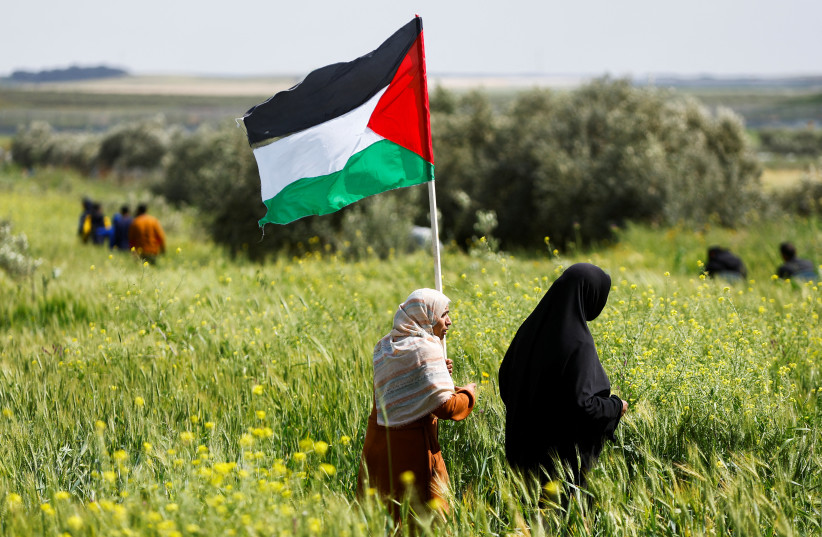Israeli settlements are frequently characterized as the main impediment to peace between Israelis and Palestinians. When pressed to explain how settlements impede peace more than terrorism and Palestinian intransigence, opponents of settlements find it difficult to articulate an answer and often end up justifying terrorism by claiming Palestinian terrorism against innocent Israelis is justified resistance against growing Jewish settlements.
While the international community allows nuance even in discussions about the October 7 attacks, Israeli settlements are rarely discussed with any nuance. To address the role of settlements in the Israeli-Palestinian conflict without nuance is canceling important factors that are necessary to understand the issue.
It’s important to understand what is and isn’t a settlement. Anti-Zionists and this includes an overwhelming majority of Palestinians, who don’t believe Israel has a right to exist, that Jews deserve their own nation in their historic homeland, and Jews shouldn’t live in any land from the Mediterranean Sea to the Jordan River, maintain that any city, whether Tel Aviv or Efrat, is an illicit settlement.
More mainstream voices accept the State of Israel as legitimate but declare any Jewish town over the Green Line, in what Arabs call the West Bank and Israelis call Judea and Samaria, to be illegal settlements.
Many Palestinians claim they don’t enjoy their own state because Israeli settlements have encroached on their lands and prevented a Palestinian state from being established. The Palestinians don’t have their own state because of Israel or Israeli settlements; the Palestinians don’t have their own state because when it was offered to them, they said no.

In 1947 the United Nations voted to split British Mandate Palestine into an Arab and a Jewish state. Instead of accepting the offer and establishing their own independent Palestinian state, the Arabs declared war on the Jews living in the land of Israel. The Arabs lost that war and an independent Palestinian state was never established.
In Israel’s 1948 Independence War, the IDF didn’t capture all the land “From the River to Sea.” The Gaza Strip and Judea and Samaria (the West Bank) were illegally occupied by the Egyptians and Jordanians, respectively.
Although the land designated for an independent Palestinian state was illegally occupied by non-Palestinian Arab governments, there was no Palestinian liberation movement to expel Egypt and Jordan within the international community or even among Palestinians themselves. Palestinians and the international community were content without an independent Palestinian state and having Egypt and Jordan govern those regions.
It was only after the Six Day War in 1967, when Israel captured those lands from the Egyptians and Jordanians, that Palestinians and the international community began to advocate for an independent Palestinian state.
The irony is that just like in 1948 when the international community offered the Palestinians a state and they rejected it, in 1967, Israel repeated the offer, willingly conceding Judea, Samaria, and the Gaza Strip to the Palestinians, Egyptians, or Jordanians, in exchange for peace, only to have the Palestinians reject their offer.
Arab rejectionism
Over the next 57 years, the Palestinians continuously rejected every peace deal offered to them. More insidiously, the Palestinians engaged in over five decades of terrorism that targeted schools, buses, and even airplanes.
The Palestinian Liberation Organization became an internationally recognized terrorist group, and its leader, Yasser Arafat, a terrorist. It was clear, even through the five years of negotiating the Oslo peace accords the Palestinians were wedded to terrorism and their primary interest lay in destroying Israel not making peace with the Jewish state or its people.
Over the next 57 years, the Jewish people began moving into the lands captured in the Six-Day War. With no prospects of peace, Israel wasn’t going to hand the land back to its enemies to serve as a launching pad for further attacks against Israel. Seeing parts of its historic homeland under its government’s control, especially the heartland of the Jewish homeland, Judea and Samaria, Israelis decided they wanted to relocate to these areas.
With Palestinians rejecting negotiations and turning to terrorism, Jews saw no reason not to move on to their lands. As the years went by, more and more Jews moved to these areas, and they began taking on a distinctive Israeli flavor, and their presence grew.
Objecting to Jews living in a certain region because 76 years ago, the United Nations designated that region to be a Palestinian state – even though the Palestinians rejected the designation – is absurd.
When considering the history of Palestinian terrorism and violence and the Palestinian refusal to negotiate for peace, the idea that Israel should give up control of these regions so they can be used for launching attacks against Israel or that the lands should remain Judenrein (bare of Jews) is ludicrous. Until Palestinians show an interest in ending the Israeli-Palestinian conflict peacefully, there is no reason to even begin a discussion about settlements.
The impediment to peace between Israelis and Palestinians isn’t Israeli settlements, it’s Palestinian intransigence and terrorism. The Palestinian rejection of the 1947 United Nations Partition Plan makes the plan and its designation of an independent Palestinian state null and void. With no Palestinian state, what remains is Israeli sovereignty over its historic homeland.
The Palestinians have made it clear that they’re more interested in destroying Israel than living next to it in peace. Israel has no responsibility to aid Palestinians in their genocidal plan to wipe out Israel. Israel should be spending its resources expanding its footprint on all areas of its historic homeland and ignoring those calling for a Judenrein Judea and Samaria.
The writer is a certified interfaith hospice chaplain in Jerusalem and the mayor of Mitzpe Yeriho, Israel. She lives with her husband and six children.
